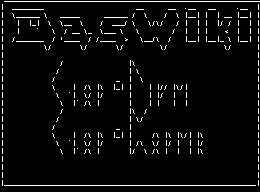- Das Wiki
- zsh.md
- zoneminder.md
- yubikey.md
- yasnippet.md
- xprofile.md
- xmonad.md
- wpa_supplicant.md
- wp3.md
- windows.md
Menu (Edit):
Link List (Edit):
# _____ __ ___ _ _
# | ____|_ __ ___ __ _ ___ ___ \ \ / (_) | _(_)___
# | _| | '_ ` _ \ / _` |/ __/ __| \ \ /\ / /| | |/ / / __|
# | |___| | | | | | (_| | (__\__ \ \ V V / | | <| \__ \
# |_____|_| |_| |_|\__,_|\___|___/ \_/\_/ |_|_|\_\_|___/
#
Wikis for Emacs
This wiki is entirely maintained from within the local configuration of NeoVIM. NeoVIM handles nearly every task needed to maintain it. The ASCII graphic is generated with the NeoVIM package, and the file structure and markdown files are all handled by the markflow.nvim package, which is excellent if you have not tried it already. Both VIM and NeoVIM have traditionally been excellent at providing extensions for users to maintain their own personal knowledge store. For VIM, this feature is provided by the legendary VimWiki package, which can also be used with NeoVIM without any problems. IMHOP, both VIM and NeoVIM are light enough and provide excellent markdown rendering and inline code redering to be excellently suited for the purpose.
But, what if you wanted to do this in EMACS? In theory, EMACS should excel at this rather simple task, but what would one use to do accomplish this task? Sadly, there are not too many options available for EMACS, well, not as many as can be found with other editors. There are many ways in which one can configure a “wiki-ish” configuration, but this is not the same thing. A good wiki package should provide structure for the wiki to exist in, this is primarily done with providing the ability for pages to internally link with one another. Wiki’s should also provide the ability to publish it’s content to the web for viewing, after all, a wiki is not very good if no one is able to look at it. Lastly, a good wiki package should be convenient to use. This is the failing of many wiki applications, they are standalone or would require an additional program for use. This would means an additional set of configuration files to manage, and the added time it takes to open and close such an application.
With all of this being said. Let’s take a look at three of the options available, and later on will dive into how to use them. These options are Org-Mode, EmacsMuse, and Easy-Jekyll mode.
Org Wiki
There is not much to be said about org wiki, as it relies mostly on org-mode to provide all the features, and merely ensures internal links to other pages are created with org-link and redirects to those pages. The wiki is then published via the org-export-dispatch feature, when can render them as either markdown or as any other wiki is published, that is in HTML. The benefit being, it all can be done from within org mode, which may not be very impressive, but certainly is sufficient and very handy.
EmacsMuse
The EmacsMuse is the successor to Emacs Wiki Mode, which was the primary means to provide a wiki functionality to EMACS and was created way back in 2005. EmacsMuse was designed for use with the web wiki framework “OddMuse” in mind, but does not require an installation of oddmuse to function. EmacsMuse can export the wiki to many different formats as desired, and provides all the usual bells and whistles one would expect from a wiki system. It even allows configuration of different source formats, so one can write the wiki in whatever markup language one prefers. All of which means, EmacsMuse is a solid solution to provide this feature.
Easy-Jekyll
Easy-Jekyll is a solution that would be missed by the consideration of many, but for our purposes at least, is a solution that will provide all the needed features. As it turns out, this wiki, “The DasWiki”, is actually a site managed by the Jekyll webframework. There is surprisingly little that separates the structure of a blog from that of a wiki, the primary difference is the taxonomy generated from it’t type of content. So, as long as one has a site format that supports a wiki, then there is no reason why a blog engine could not maintain it as well.
(use-package easy-jekyll
:init
(setq easy-jekyll-basedir "~/wiki/"
easy-jekyll-url "https://anoduck.github.io"
easy-jekyll-root "~/Sandbox/wiki/")
:bind ("C-c C-e" . easy-jekyll))
 Anoduck's Das Wiki
Anoduck's Das Wiki